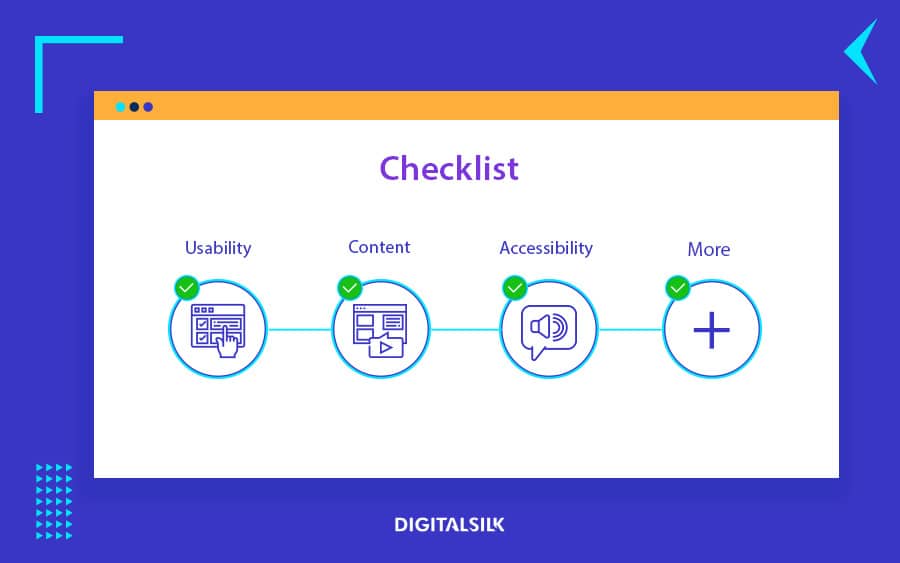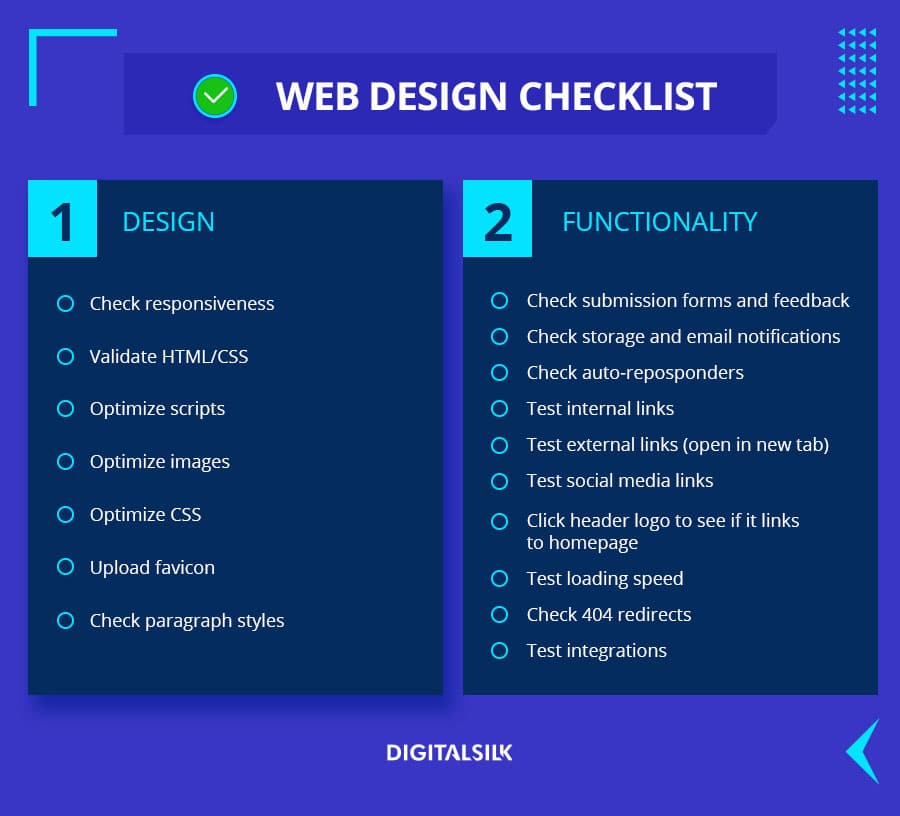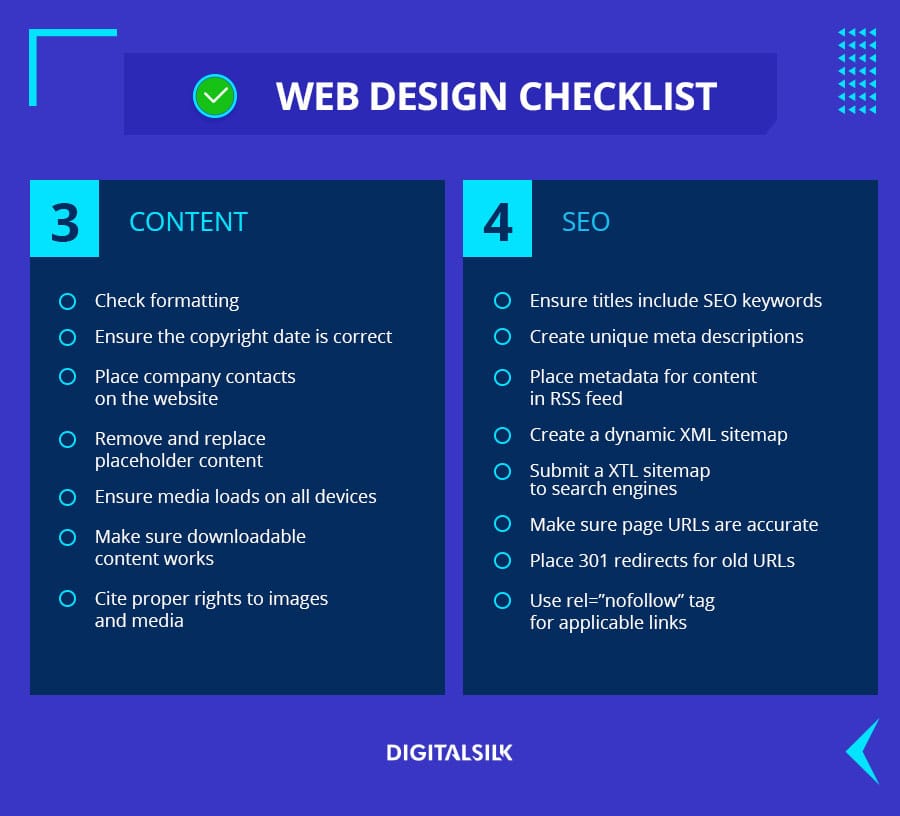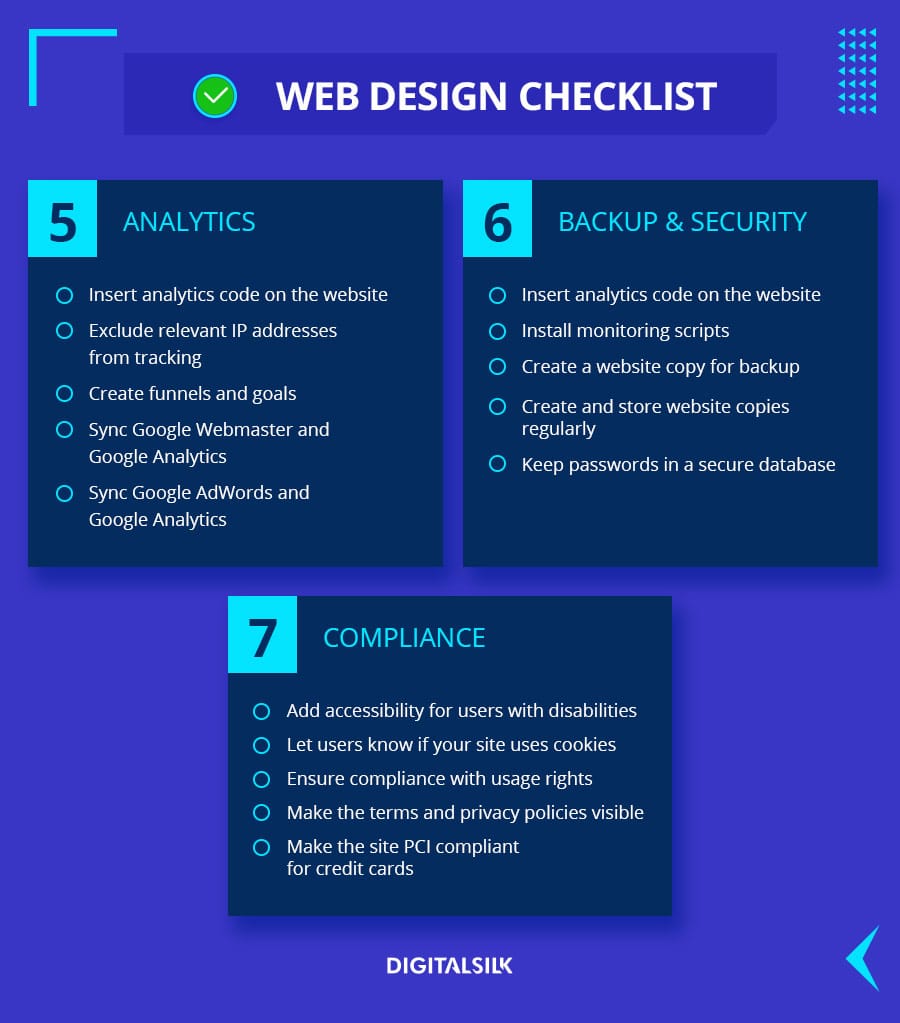Over 20% of startups fail within their first year, according to data from the U.S. Bureau of Labor Statistics.
Among the reasons for their failure are the lack of a business plan and the inability to understand the basics of online success.
Having a clearly defined web design and development strategy plays an essential role in turning your website into a lead-generating platform.
A website design process checklist keeps the web design journey on track, steering it toward success. We will explore how these checklists help businesses acquire high-converting websites and boost the productivity and efficiency of web design teams.
Let’s begin!
Digital Silk builds custom websites. Request a quote
What Is A Website Design Checklist?
A website design checklist is a document that helps web designers and web design companies keep track of the website design process, throughout each stage.

Specifically, these checklists help them stay on top of things like coding, programming, testing, designing prototypes and dealing with client requirements.
The web design process checklist covers critical areas of the journey such as usability, adherence to standards, content, accessibility and more.
Why Use A Web Design Checklist?
Using a web design checklist is important to make sure that your team doesn’t miss any deadlines and that each part of the project gets done efficiently, without overlooking any aspects.
During the web design process, there is a lot to keep track of and a website design checklist helps streamline the design and development phase.
Without using a web design checklist, the team can forget details, especially when the deadline is approaching and the web design process is completed in a rush.
Using a web design checklist helps ensure the process is smooth and comes with these added benefits:
- The website is and easy to use because the designers followed the UX and UI best practices
- Messaging is clear and to-the-point because formatting has been double-checked and proofreading has been performed
- Designers apply web design conventions by adhering to compliance standards
- The website earns the audience’s trust through brand and voice alignment that web designers achieved through research and development
- The website is safe because all backup and security precautions are in place
- The online visibility is increased by following the SEO best practices
- Results are measurable thanks to incorporated analytics
Fundamentals Of A Web Design Checklist Template
Before compiling the most helpful version of a checklist that will align closely with the kind of website you will create, you’ll need to consider the fundamentals that will help you define the kind of website you need.
These steps will provide you with an overview of how your website should operate, which goals you should focus on and what items you need to add to your web design checklist.
1. Map Out The Plan Before You Build The Checklist
Create a wireframe or a site mockup, as well as a sitemap, before you begin your web design and web design checklist process. This will provide a clear overview of the process.
2. Analyze The Previous Website (If Any)
If you have a current website, detail what changes need to be made and why. Ask yourself these questions to set the goals for the new website:
- What is the purpose of a new design and overhaul?
- What did the existing website fail to accomplish?
- How will the new design serve the business?
3. Identify The New Design Goals
Whether your website needs to be more user-friendly or more visually appealing, by understanding your goals, you can create the website strategy and checklist to make them happen.
4. Come Up With A Technical SEO Strategy
Give your new website a basis for SEO success by keeping the content hierarchy and site architecture in check. These elements, which will comprise your web design checklist, should be defined by these preliminary steps:
- Keyword research to decide what keywords your website will rank for
- A content strategy that follows the above keywords
- A map of where superfluous pages will redirect to
5. Establish Your Conversion Paths
At this step, you need to determine the actions you want your visitors to take in order to convert. You’ll also want to capture their information as a point of contact. This will be an important part of your website design checklist. To do this, ask yourself:
- What content you should have at all three stages of the funnel: top, middle and bottom?
- What CTAs and forms you should have on your website?
- How will you track the conversions?
- What action will take place once the visitor has converted or submitted their information?
6. Decide How You Will Measure Results
At this point, you need to decide which analytics platform(s) will you be using, decide whether any previous tracking scripts will be used and set up new accounts if needed.
Speak with our experts. Schedule A Consultation!
Website Design Audit Checklist: 40+ Items To Check Before Launching A Website
The modern web design checklist should contain all the items and checkpoints that a team of web designers should take care of during the development process.
For ease of use, it’s advisable that the checklist be divided into several thematic sections, each covering a specific aspect of the website.
A very comprehensive website design audit checklist should contain the following sections and items:

1. Design
1. Make sure the website is compatible with different devices and browsers
2. Validate HTML/CSS properly
3. Optimize scripts across all pages
4. Optimize images across all pages
5. Optimize CSS across all pages
6. Upload the favicon and make sure it renders properly
7. Make sure the paragraph styles such as quotes, lists and headers are working correctly
2. Functionality
8. Check whether forms submit data successfully and a thank you message is displayed afterward
9. Make sure that form info is stored in a company database and is emailed to a recipient
10. Check to make sure auto-responders work properly
11. Ensure internal links across the website work properly
12. Ensure external links across the website work properly and open in a new tab
13. Make sure social media share icons work properly
14. Make Sure news, social media and RSS feeds are working properly
15. Check to make sure the company logo links to the home page
16. Ensure the loading page speed is optimized and kept at a minimum
17. Make sure that 404 redirect pages are in place
18. Make sure that third-party tools integrations run successfully

3. Content
19. Check the formatting of headers, lists and paragraphs
20. Make sure the copyright date in the footer includes the current year
21. Place accurate company contacts on the website
22. Remove any generic placeholder content and replace it with proper content
23. Check if images, videos and audio files are all in place and load properly on all devices
24. Make sure that downloadable content such as e-books and white papers work properly
25. Cite and license the proper rights to images, fonts and other media
4. SEO
26. Make sure web pages all have unique H1 titles and SEO titles that include keywords
27. Make sure unique meta descriptions for every page are in place
28. Place the metadata for any content in RSS feed
29. Create a dynamic XML sitemap
30. Submit the dynamic XTL sitemap to search engines
31. Check to make sure that page URLs reflect site information architecture
32. Place 301 redirects for old URLs
33. Put a rel=”nofollow” tag for applicable links

5. Analytics
34. Insert analytics code on the website
35. Exclude relevant IP addresses from analytics tracking
36. Create funnels and goals in your analytics software
37. Sync the Google Search Console and Google Analytics accounts
38. Sync Google AdWords and Google Analytics accounts
6. Backup & Security
39. Install monitoring scripts
40. Create a copy of the final website for backup purposes
41. Create and store backup copies of the website regularly
42. Keep passwords and other website credentials in a secure database
7. Compliance
43. Provide accessibility for users with disabilities
44. Let users know if your website uses cookies
45. Make the website compliant with usage rights for bought code, fonts and images
46. Make the terms and privacy policies visible to visitors
47. If you’re processing and storing credit card info, make the website PCI compliant
Website Design Checklist Takeaways
Website design checklists help businesses create a fully-functioning website, optimized for generating and guiding high-value leads from the initial touchpoint to checkout or conversion.
They also help web design teams stay on top of the project by following the items in the checklist, enabling them to deliver the finished web site efficiently.
To make sure you have the best-fitting checklist for your website project, you first need to:
- Create a wireframe and a sitemap for your future business website
- Analyze the previous website to make well-informed decisions about the redesign
- Establish your website’s goals
- Create technical SEO tactics
- Define conversion paths
- Decide how you will measure results and establish KPIs
A web design checklist can consist of variously arranged items that are important for building a well-functioning, visible business website. However, these items should ideally fall into the following standard sections and website aspects:
- Design
- Functionality
- Content
- SEO
- Analytics
- Backup & security
- Compliance
"*" indicates required fields









